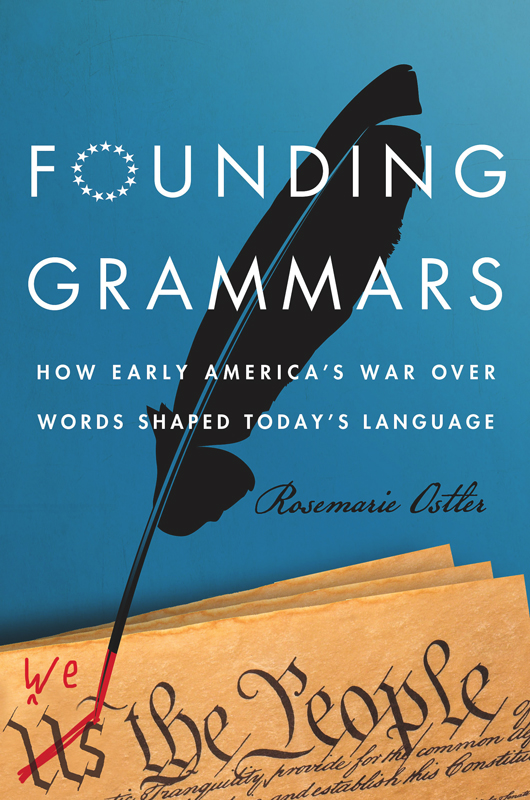
Founding Grammars
How Early America's War Over Words Shaped Today's Language
کتاب های مرتبط
- اطلاعات
- نقد و بررسی
- دیدگاه کاربران
نقد و بررسی

February 9, 2015
A freelance writer specializing in American words and usage, Ostler has written an amiable but overly selective history of grammar in the U.S. She gives a sweeping account of American language and the personalities who shaped it, from the 18th century to the present. Ostler pays extended homage to the hugely influential Noah Webster. She also describes influential, little-known 19th-century grammarians, starting with Lindley Murray. David Crockett and Theodore Roosevelt make cameo appearances, representing powerful forces in American language. Ostler’s most vivid chapter details William Strunk Jr. and his primer, The Elements of Style, first published in 1918, and E.B. White’s work on subsequent editions of the book. Her survey is entertaining, but omits important arbiters of American language, from Emily Post to the Associated Press, and neglects the role of mass market schoolbooks such as the McGuffey Readers and the Dick and Jane series. Still, Ostler will find an appreciative audience among the many readers who delight in the rules, ideals, and controversies of English expression. Agent: Janet Rosen, Sheree Bykofsky Associates.

February 1, 2015
Since Colonial times, Americans have taken grammar as a touchstone of social and educational status. Linguist and former librarian Ostler (Slinging Mud: Rude Nicknames, Scurrilous Slogans, and Insulting Slang from Two Centuries of American Politics, 2011, etc.) provides a history of the struggles over our language.The author begins with Noah Webster, who, before compiling the first American dictionary, wrote a three-volume grammar text, arguing that the way Americans actually speak was the best foundation for the study of grammar. Unfortunately for Webster, Robert Lowth, an Anglican bishop and author of A Short Introduction to English Grammar, already occupied the high ground in the field of grammar textbooks. Lowth was among the first to pontificate against double negatives and ending sentences with prepositions, rules that remain dear to grammatical purists. Even more influential was Lindley Murray, whose grammar book became the standard during much of the 19th century. In those books, the battle lines were drawn, pitting Latinate rules against the study of vernacular speech. Ostler follows the skirmishes over the years, examining the growing influence of frontier Americans like Davy Crockett and Andrew Jackson. However, the sophisticated classes of New York and Boston carried more weight with those interested in improving their grammar. Even Abraham Lincoln had to contend with snobs who found his homespun anecdotes proof of his boorish origins. While subsequent generations learned to see the charms of Mark Twain and other vernacular writers, those with a claim to education still avoided split infinitives and shunned "ain't" as the stain of ignorance. Practitioners of scientific linguistics, who strove to describe usage rather than prescribe rules, made few inroads with the way grammar was taught, and Webster's Third International outraged purists by including "ain't" and other substandard usages. The controversies that followed get full play, as Ostler (who clearly sympathizes with the descriptive camp) brings the "war of grammar" up to the present. Lively and revealing discussion of a battle that seems likely to continue as long as English is spoken.
COPYRIGHT(2015) Kirkus Reviews, ALL RIGHTS RESERVED.

May 15, 2015
Linguist Ostler (Slinging Mud; Let's Talk Turkey) provides a historical account of the evolution of grammar thought in America, from the time of the Revolutionary War to the present day. While technical terms are sometimes used, the volume reads more like a history than a grammar book. In neatly arranged sequence, the author covers many who were important in the development of an American way of language, including Noah Webster, Lindley Murray, and William Bentley Fowle. Contemporary thought is shared, including why the book Abraham Lincoln is reported to have walked miles to return may have been a grammar book, and why "bad grammar" was a catchphrase for low class. This is a comprehensive look at all things grammar, from Webster's speaking tours to the uproar over the third edition of his dictionary and from Strunk and White to Grammar Girl. Ostler touches on various heated debates, the vitriol of which will not surprise grammar aficionados, and the rise of linguistics. VERDICT Fans of Lynne Truss, those who have been known to read dictionaries, or anyone with an interest in language history will find this a worthy addition to the grammar conversation.--Linda White, Maplewood, MN
Copyright 2015 Library Journal, LLC Used with permission.

April 1, 2015
In the present era, when e-mail, instant messaging, and the ubiquity of mass media so profoundly affect usage of the English language, grammar and syntax seem to be under unprecedented assault. Ostler's remarkable history reminds us that English underwent a no-less-alarming evolution as American colonists' language began diverging from standard British speech. Not wanting to appear unlettered bumpkins, American settlers lugged two books into the frontier: the Bible and a grammar. Noah Webster published America's first successful grammar, promoting uniquely American words and constructions, some brought from England, some arising from Native American tongues. He deplored excessive influence on American speech of complex Latinate conjugations and declensions. Webster's book soon yielded primacy to one by Yorkshireman Lindley Murray. Other grammar books emerged to satisfy needs of women and of blacks, both slaves and freedmen. Abandoning grammar for lexicography, Webster achieved immortality. Nineteenth-century grammarians flourished, and the twentieth century ushered in Strunk and White, but the battle between descriptive and prescriptive linguists continues unabated.(Reprinted with permission of Booklist, copyright 2015, American Library Association.)

























دیدگاه کاربران